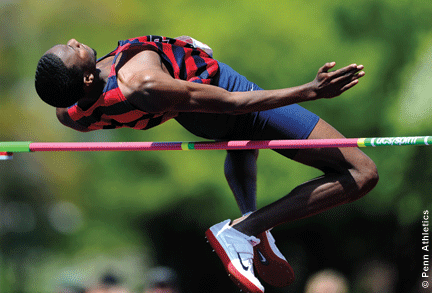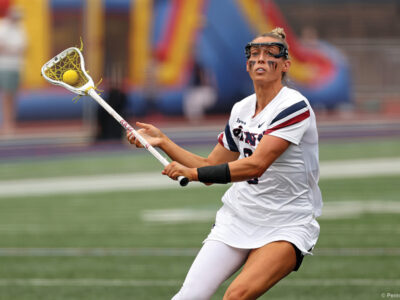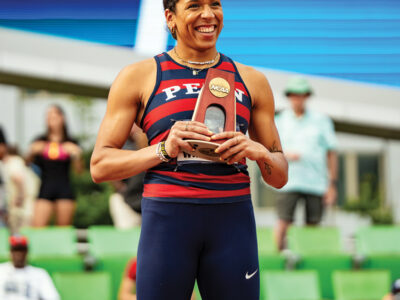
By Dave Zeitlin | Maalik Reynolds only started jumping as high as he could because his eighth-grade science teacher made him do it, and even then he did it simply as a supplement to his basketball career.

Leslie Kovach only started running for miles at a time because her father made her do it, and even then she did it simply as a supplement to her soccer career.
For Reynolds and Kovach, though, what began as reluctant side endeavors quickly turned into unrelenting passions, taking them each to the very top of the college track and field world. Reynolds, a freshman high jumper, and Kovach, a sophomore distance runner, both represented Penn at the NCAA Track and Field Championships in Des Moines, Iowa, in June by jumping higher and running faster than just about every student-athlete in the United States.
At the national final meet, Reynolds placed seventh overall in the high jump while Kovach took 18th in the 5,000-meter race. Both entered the Penn record books as All-Americans, with Reynolds becoming the first male track and field All-American at Penn since Courtney Jaworski C’06 in 2005 and Kovach the first female All-American since Chris Lundy C’92 V’96 in 1992 (and only the second ever).
For Reynolds, the NCAA championships were a fitting cap to a truly remarkable season. In his first year at Penn, the 6-foot-5 freshman out of Atlanta set the school record in both the indoor and outdoor high jump while capturing Penn Relays and Ivy League Heptagonal Championships titles in the event. He became the first Penn athlete to win the high jump at the Penn Relays since Will Lee C’55 shared the crown with three others in 1955, and his jump of seven feet, 5 inches at Heps the following week was not only a personal best but matched the second best height in the country to that point. “At first, it surprised me,” said Penn’s longtime men’s track and field coach, Charlie Powell. “Now, he’s just doing what we expect. He’s a talent. He’s a tremendous talent.”
Powell knew Reynolds was a talent when he recruited him out of Westminster School, where, despite also focusing on basketball, Reynolds was the 2010 Atlanta Track Club Man of the Year and one of the country’s most coveted track and field recruits. Landing Reynolds was a coup for Powell, who, like many Penn coaches, sold the high jumper on the combination of the school’s rich athletic history and the opportunities Wharton provides. “A young man like that,” Powell said, “is being sought after by everybody.”
Still, Powell did not realize the extent of Reynolds’ upside. At Penn, as he stopped playing competitive basketball, devoted himself even more to training, and matured by the day, the freshman just continued to raise the bar—literally. “My main thing I try to focus on every meet is consistency, just doing the same thing every jump,” said Reynolds, who was kept out of competing in the indoor NCAA championships by a case of food poisoning. “I think about three main things—accelerating on my curves, staying tall, and staying quick off my feet. I just think about those things over and over.”
The result of his hard work has been astounding, with Reynolds improving his jump by about five inches, blossoming from an up-and-comer into a prodigy. The big part of his growth as a jumper, his coach believes, stems from his growth as a person. “When you get to a national level, to improve by one inch is a lot in a year,” Powell said. “How does it happen? He’s just growing into his body. He’s not really matured. A guy that tall, your body doesn’t come together for a couple of years.”
Kovach has taken extraordinary strides, as well. After an unremarkable freshman campaign, the sophomore out of Irwin, Pa., shaved her time in the 5,000 meters (also known as the 5k) from 16 minutes, 54 seconds to a blazing 16:11.59, a time that smashed the Penn record by nine seconds. (She also holds the school’s best mark in the indoor 5,000 meters and the outdoor 10,000 meters.) Even better, the 5K record was set on her home turf at the Penn Relays.
Kovach later qualified for the NCAA finals when she finished fourth in her heat at the NCAA East Preliminary Round in Bloomington, Ind., a race in which she beat one of the country’s most accomplished runners, Villanova’s Sheila Reid.
Perhaps the only thing more surprising than Kovach’s road to success is where that road began. Much like Reynolds, her track career developed from equal parts skill and good fortune. When she first began to run in middle school, at her father’s urging, she viewed it as a chore, something to keep her in shape for soccer. “I actually hated it,” Kovach admitted. “I’d try to get out of it as much as I could. My dad would be like, ‘OK, you’ve got to go running today.’ And I’d be like, ‘Really? I have practice at 6. I’m not going.’”
But soon, Kovach’s competitive streak began to sneak into her running. Three-mile runs turned into nine-mile runs. Leisurely jogs turned into well-paced trots. And when she entered the ninth grade at Norwin High School outside Pittsburgh, she went out for the cross-country team instead of the soccer team. It was there, at Norwin, that she showed both her ever-growing talent (by winning the state title in the 3,200-meter run as a senior) and her competitive drive (by running a two-mile district qualifying race despite being ill and collapsing at the finish line, prompting the official to tell the next batch of runners, “If this girl can finish it, you can too!”).
Seeing the kind of conviction she had, Boldon, a first-year coach at Penn, helped increase Kovach’s fitness with a more structured training regimen (she typically runs about 80 miles per week), so, he said, “when it comes to that moment in a race when your will can make a difference, your body is prepared to do what your will wants.” Now, Kovach seems to be able to find that extra gear in the final lap, as her record-setting races have shown. “Before,” the sophomore said, “I’d always hit a wall with however much left to go. I was never a kicker. This year, I seem to be finishing stronger than I have in the past. That’s a positive change.”
Even with all of her improvements, though, Boldon still called Kovach an underdog on the national stage. Reynolds, on the other hand, is now widely known to be one of the country’s premier college jumpers. And here’s the scary part: he still has three more years left at Penn.
“As he gets faster and stronger, and more and more confident with his technique, and things really start falling together, he could be a national champion,” Powell said. “He could be a world record holder.”
Lacrosse Lives Here
By the program’s own lofty standards, the 2011 Penn women’s lacrosse season could have been considered a disappointment. The Quakers saw their 34-game Ivy League winning streak come to an end, before losing to nemesis Princeton in the league playoffs and then bowing out of the NCAA tournament in the opening round, marking the first time since 2006 they failed to make it to at least the national quarterfinals.
But considering that head coach Karin Brower Corbett’s squad graduated an impeccable senior class from a year ago—one that included the first Tewaaraton Award (given to the country’s best player) finalist in school history, Ali DeLuca C’10—just qualifying for the NCAA tournament was an achievement for the 2011 group.
“We were definitely disappointed we didn’t get as far as we have been, but we beat some really great teams this year,” said Giulia Giordana C’11, who leaves Penn as the program’s 10th all-time leading scorer. “I’m proud of our team. The class before us was amazing and we lost a lot of great players. We were young this year but I feel like some of the girls really developed. I was happy to be a part of it and I can’t wait to see what they do in the next couple of years.”
It would appear that in the next couple of years, the Penn women’s lacrosse team will continue to be a dominant team. It would also appear that they’ll have company from their co-tenants at Franklin Field.
This year, for just the third time since 1989, the Penn men’s lacrosse team earned a bid to the NCAA tournament. And even though, like the women’s squad, the Quakers lost in the first round, the turnaround was still remarkable for a team that finished last in the Ivy League just one year ago.
Perhaps now, the two lacrosse programs at Penn are ready to excel on the national stage, side by side.
“Our sports are pretty different,” men’s lacrosse coach Mike Murphy said. “But what they really showed us is that you can be great here at Penn. You can win at the highest level. ”
Dave Zeitlin C’03 writes frequently for the Gazette and oversees the magazine’s sports blog.




